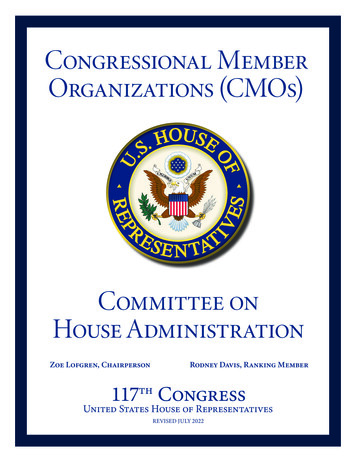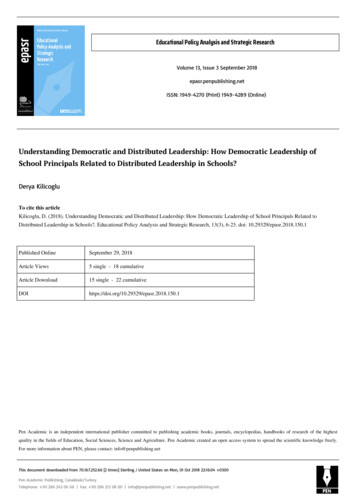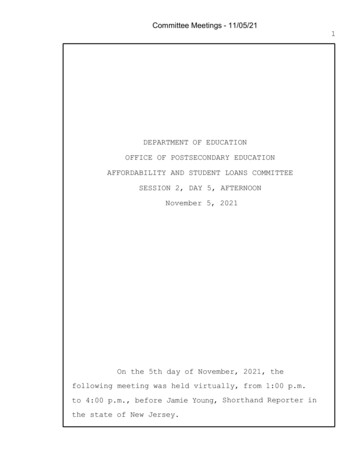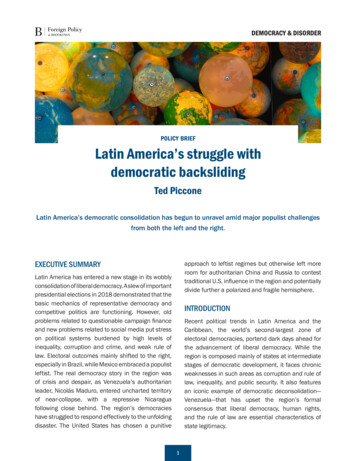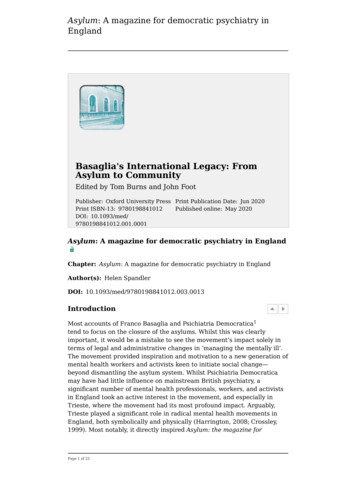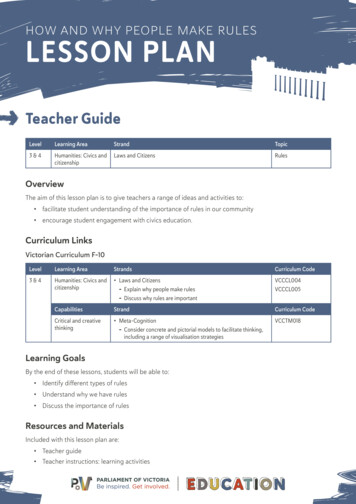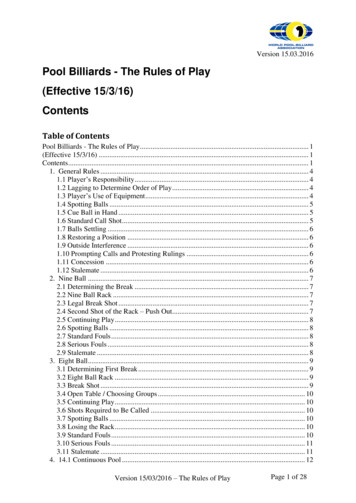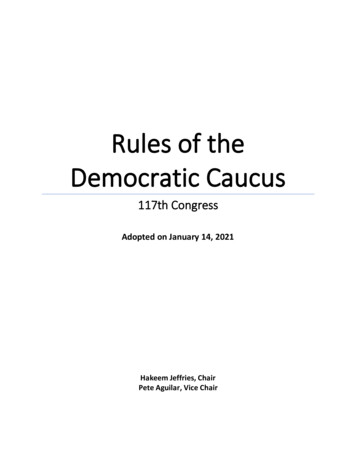
Transcription
Rules of theDemocratic Caucus117th CongressAdopted on January 14, 2021Hakeem Jeffries, ChairPete Aguilar, Vice Chair
CONTENTSDefinitionsTitle I: Rules Related to Caucus Organization and OperationCaucus OrganizationRule 1.Caucus MembershipRule 2.Party Leaders and Officers of the CaucusRule 3.Caucus Election ProceduresRule 4.Temporary Step-Aside of a Member of the Leadership Who Is IndictedRule 5.Automatic Replacement of a Member of the Leadership Who Is ConvictedRule 6.Nominations for Officers of the HouseCaucus MeetingsRule 7.Calling and Scheduling Caucus MeetingsRule 8.Notice and Agenda of Caucus MeetingsRule 9.Admittance to and Procedure in Caucus MeetingsCaucus EntitiesRule 10.Democratic Steering and Policy CommitteeRule 11.Regions, Regional Elections, and Regional WhipsRule 12.Democratic Congressional Campaign CommitteeRule 13.Committee on Caucus ProceduresCodification and Amending of the Caucus RulesRule 14.Procedure for Amending Caucus RulesRule 15.Exemptions, Exceptions, and Waivers of Caucus RulesTitle II: Rules Related to CommitteesCommittee AssignmentsRule 16.Committee Ratios; Temporary Assignments to CommitteesRule 17.Classification of CommitteesRule 18.Restrictions on Committee MembershipsRule 19.Nominations for Membership on Standing CommitteesRule 20.Procedure for Electing Members to Standing Committees1
ChairsRule 21.Rule 22.Rule 23.Rule 24.Rule 25.Rule 26.Nomination and Election of Committee Chairs of Standing Committees; Committees’Selection of Vice ChairsLimitations on Chairs of Committees and Subcommittees; Exceptions to LimitationsFilling a Vacancy in the Position of Chair of a CommitteeTemporary Step-Aside of a Chair Who Is IndictedReplacement of a Chair Who Is Censured or ConvictedCommittee and Subcommittee StaffSubcommitteesRule 27.Committee Caucus Organizational MeetingRule 28.Election of Chairs of Subcommittees; Exceptions to LimitationsRule 29.Filling a Vacancy in the Position of Chair of a SubcommitteeRule 30.Procedure for Electing Members to SubcommitteesRule 31.Limitations on Subcommittee MembershipRule 32.Subcommittee VacanciesRule 33.Appointments to Joint and Select Committees, Boards and CommissionsTitle III: Rules Related to Floor and Conference ProcedureRule 34.Binding Votes on House LeadershipRule 35.Closed Rule LimitationRule 36.Notice of Appropriations ViolationsRule 37.Committee Review of Legislation Developed by Ad Hoc Task ForcesRule 38.Guidelines on Suspensions of House RulesRule 39.Motions to Recommit; Motions to Instruct ConfereesRule 40.Role of Subcommittee Chairs on the FloorRule 41.Democratic Representation on Conference CommitteesRule 42.Diversity Rule2
DefinitionsUnless otherwise specified within a Rule: All references to the “Caucus” refer to the Democratic Caucus of the House of Representatives. All references to “Rules” refer to the Rules of the Democratic Caucus, unless otherwise specified. All references to “Speaker” refer to the Democratic Caucus nominee for Speaker and, when in theminority, the Democratic Leader. All references to “Assistant Speaker” refer to the Assistant Speaker and, when in the minority, theAssistant Democratic Leader. All references to “Caucus Chair” refer to the Chair of the Democratic Caucus. All references to “Vice Chair” refer to the Vice Chair of the Democratic Caucus, unless otherwisespecified. All references to the “Chair” when in reference to a committee of the House, or a subcommitteethereof, should be read to mean the Democratic Chair or the Democratic Ranking Member. All references to the “Vice Chair” when in reference to a committee of the House, or asubcommittee thereof, should be read to mean the Democratic Vice Chair or the DemocraticRanking Vice Member. All references to “Member” or “Members” are references to one or more Democratic Members (orDelegates or the Resident Commissioner of Puerto Rico) of the entity named, such as the Caucus,House committees, or House committees’ subcommittees. The Democratic Congressional Campaign Committee shall be referenced as the “DCCC.” The Democratic Steering and Policy Committee shall be referenced as “Steering and Policy.” The Co-Chairs of the Democratic Policy and Communications Committee shall be referenced as“DPCC Co-Chairs.” The Caucus Leadership Representative shall be referenced as “CLR.” The Freshmen Leadership Representative shall be referenced as “FLR.”3
Title I: Rules Related to Caucus Organization and OperationRule 1. Caucus MembershipA. All Members of the House of Representatives, the Resident Commissioner from Puerto Rico, and theDelegates from American Samoa, the District of Columbia, Guam, the Northern Mariana Islands, andthe Virgin Islands who are Members of the Democratic Party shall be prima facie Members of theDemocratic Caucus of the House of Representatives.1. Except that when a Member resigns from the Democratic Party or acts affirmatively to changepolitical parties, the Member shall automatically cease to be a Member of the Caucus.a) Such acts shall be limited to:(i) Changing party registration in their home state, or(ii) Filing for office as a candidate for nomination of or accepting the nomination of anotherpolitical party, unless the Member files for or accepts the nomination of another partyin addition to accepting the nomination of the Democratic Party.2. The following procedures shall govern when a Member chooses to leave the Democratic Party.a) The Caucus Chair shall notify a Member in writing when they cease to be a Member of theCaucus in accordance with subparagraph 1.b) The Member shall have the opportunity to request reinstatement, provided the request hasthe support in writing of at least five Members delivered by letter to the Chair.(i) Within 10 days of such a request, the Caucus shall meet.(ii) The Member shall be reinstated by a majority vote, of those voting and present, bysecret ballot, at the meeting.c) If the Member is not reinstated within 30 days of receiving notification, the Caucus Chairshall notify the Speaker of the House that the Member is no longer a Member of theDemocratic Caucus.3. The Caucus may expel any Member by a two-thirds vote, of those voting and present.B. In order to maintain membership in good standing, Members shall not participate in campaignactivities for any candidate in a partisan federal election who is not a Member of the DemocraticParty.4
Rule 2. Party Leaders and Officers of the CaucusA. The Caucus shall nominate a candidate for Speaker of the House of Representatives.1. During any time that the Democratic Party is not the majority party of the House ofRepresentatives, any reference to, and any authority vested in, the Speaker under these Rulesshall be considered references to and authority vested in the Democratic Leader.B. The Caucus shall elect the Democratic Leader, the Democratic Whip, and the Assistant Speaker.C. The Caucus shall elect a Chair and a Vice Chair.1. No Member shall be elected to serve as Chair or Vice Chair of the Caucus for more than twoconsecutive full terms.2. The Vice Chair shall perform the duties of the Chair during the temporary absence of the Chair.The Chair or Vice Chair shall have the right to name any Member to perform the duties of theChair during a temporary absence.D. The Caucus shall elect a Chair of the Democratic Congressional Campaign Committee at a meeting ofthe Caucus no later than March 1 of the first session of a new Congress.1. Candidates for Chair shall not necessarily already be a Member of the DCCC.2. The Chair of the DCCC shall serve while a Member of the House and until a new Chair is elected.3. If a vacancy in the office of the Chair occurs at the beginning of a Congress, the Speaker shallappoint a temporary Chair to serve until a new Chair is elected pursuant to the provisions of thisparagraph.4. If a vacancy occurs in the office of Chair prior to the end of a Congress, the Speaker shall appointa temporary Chair immediately and convene a meeting of the DCCC within 45 days of thevacancy to nominate a new Chair.a) The Caucus shall act upon that nomination and additional nominations made from the floorof the Caucus on petition of five Members of the Caucus within 75 days of vacancy.E. The Caucus shall elect four Co-Chairs of the Democratic Policy and Communications Committee.1. The Caucus shall elect four Members to serve as the Co-Chairs of the DPCC. The Co-Chairs willbe elected through a multi-candidate election. Each Member will cast votes for up to fourcandidates, and the winners shall be determined by the four candidates who receive the mostvotes.5
2. The four DPCC Co-Chairs shall serve no more than two consecutive full terms for the position ofDPCC Co-Chair.F. The Caucus shall elect a Caucus Leadership Representative.1. The Caucus shall elect a Member who has served five terms or less to serve as the CLR. Thatperson will be elected by majority vote of the Members who have served five terms or less,when a quorum of their membership is present and voting.a) A “term” is defined as a two-year period beginning on January 3 of each odd-numbered year(or the official start date of a new Congress), using the meaning established by the Clerk ofthe House and House Rules.b) The definition of “five terms or less” shall include the term for which the Member is seekingthe position.c) No Member who has served any length of time greater than five full terms, including theterm for which the Member is seeking the position, shall be eligible to serve as the CLR or tovote for the CLR.2. No Member shall be elected to serve as the CLR more than one full term.G. The Caucus shall elect a Freshmen Leadership Representative.1. The Caucus shall elect a Member of the freshmen class who will serve as the FLR. That personwill be elected by majority vote of the Members of the freshmen class, when a quorum of theirmembership is present and voting.Rule 3. Caucus Election ProceduresExcept as otherwise provided by another Rule, the following provisions shall apply to all elections in theCaucus or in entities of the Caucus:A. A quorum, which shall consist of a majority of the Members of the Caucus, shall be required toproceed.B. The name of each candidate shall be placed in nomination.1. Nominations shall be limited to not more than one 5-minute nominating speech and three 2minute seconding speeches on behalf of each candidate so nominated.2. For the positions of the DPCC Co-Chairs, the CLR, and the FLR, the Caucus Chair may, inconsultation with the candidates and the Caucus, establish alternate time limits fornominations.6
C. After nominating and seconding speeches, balloting shall proceed without interruption or recessfrom ballot to ballot until one candidate has received the votes of a majority of those present andvoting, or other requirements detailed below. Such candidate shall be declared elected.1. All votes shall be by secret ballot, except when a motion is made to waive the secret ballot, oron committee lists where no secret ballot is demanded under Rule 20.2. If there are more than two candidates, the nominated candidate receiving the fewest votes onthe first and each succeeding ballot shall be eliminated. Votes for an eliminated candidate shallnot be tallied nor considered except to determine the number of Members present for thatvote.3. Votes cast for a person whose name was not placed in nomination shall not be counted norconsidered except to determine the number of Members present for that vote.4. If two or more candidates tie for fewest votes on the first ballot, or on subsequent ballots,neither shall be eliminated; should this occur for a second time, however, both shall beeliminated.5. Following any ballot, a candidate wishing to withdraw shall be entitled to recognition for oneminute for the purpose of so advising the Caucus.6. For the position of DPCC Co-Chairs, the winners shall be determined by the four candidates whoreceive the most votes, with a quorum being present.Rule 4. Temporary Step-Aside of a Member of the Leadership Who Is IndictedA. The Speaker, Democratic Leader, Democratic Whip, Assistant Speaker, Chair or Vice Chair of theCaucus, Chair of the DCCC, any one of the DPCC Co-Chairs, CLR, or FLR who is indicted for a felonyfor which a sentence of two or more years of imprisonment may be imposed shall step aside andcease to exercise the power of their office.B. Upon the step-aside of the Member, the Caucus may determine who shall exercise those powers ona temporary basis.C. If the Member steps aside pursuant to paragraph A, and subsequently the charges are dismissed orreduced to less than a felony as described in paragraph A, or if the Member is found not guilty ofsuch charges, that Member shall automatically resume the powers and the duties of that officeunless the Caucus decides otherwise within 10 legislative days.Rule 5. Automatic Replacement of a Member of the Leadership Who Is ConvictedA. The Speaker, Democratic Leader, Democratic Whip, Assistant Speaker, Chair or Vice Chair of theCaucus, Chair of the DCCC, any one of the DPCC Co-Chairs, CLR, or FLR who is convicted of a felonyfor which a sentence of two or more years of imprisonment is imposed shall cease to exercise the7
powers of their office, shall be removed from such position, and shall not serve in any such positionfor the remainder of that Congress.B. Immediately upon the removal of any Member from a position described in paragraph A, the Caucusshall select a replacement in accordance with Rules 2 or 3.Rule 6. Nominations for Officers of the HouseA. The Speaker shall recommend to the Caucus nominees for the Officers of the House, such as theClerk, Sergeant-at-Arms, Chaplain, and Chief Administrative Officer.B. The Caucus shall vote on the nominations.1. Upon a demand supported by 10 or more Members, a separate vote, by secret ballot, shall behad on any nomination. Any debate on such a demand, shall be limited to no more than 30minutes with the time equally divided between proponents and opponents of the nomination.2. If a majority of those present and voting reject a nominee, the Speaker shall be entitled tosubmit new nominations until the position is filled.Rule 7. Calling and Scheduling Caucus MeetingsA. The Caucus shall meet regularly while the House of Representatives is in session.B. Meetings of the Caucus shall be called by the Caucus Chair upon their own motion, at the request ofthe Speaker, or upon the written request of 50 Members.C. Members shall not schedule committee meetings or hearings at times when the Caucus is in session.Rule 8. Notice and Agenda of Caucus MeetingsA. The Caucus Chair shall set the time and place of each meeting of the Caucus. The Chair shall provideMembers with an agenda listing all matters to be considered by noon on the fifth day preceding theday on which the Caucus meeting is to be held.1. The Caucus Chair may waive the five-day notice requirement with reasonable notice toMembers when the purpose of the meeting is to consider a veto override, legislation that hasbeen reported to the House, or legislation scheduled for House consideration.B. An addition to the agenda shall not be in order except as specified in this paragraph.1. The agenda for each meeting called pursuant to the five-day notice requirement shall includeany matter requested in writing by five or more Members and delivered to the office of theCaucus Chair on the same day the notice and agenda were issued under paragraph A.8
a) The Caucus Chair shall provide Members with written notification of any addition to theagenda under this subparagraph not later than 5 p.m. the following day.b) This subparagraph shall not apply to any meeting for which the five-day notice requirementhas been waived by the Caucus Chair.2. The agenda shall include additional items requested by the Caucus Chair, or by the Speaker, orupon petition by 50 Members delivered to the office of the Caucus Chair by noon on the secondday preceding the day on which the Caucus meeting is to be held.a) The Caucus Chair shall provide Members with written notification of any addition to theagenda under this subparagraph not later than 5 p.m. the same day.3. By a two-thirds vote of the Caucus, where the additional matter has been available for at leasttwo hours.C. It shall not be in order to offer an amendment to a resolution being considered in Caucus that addslanguage directing or instructing the Democratic Members of a committee on any matter, unless theintent to instruct said Members was noticed in accord with the provisions of this Rule.D. A meeting of the Caucus may, at the call of the Caucus Chair or upon motion, be recessed and laterreconvened for continuation of properly noticed business, at a time and place designated, exceptduring election balloting as provided in Rule 3.C.Rule 9. Admittance to and Procedure in Caucus MeetingsA. No persons, except Members of the Caucus, a Caucus Transcript Clerk, and other necessaryemployees, shall be admitted to a meeting of the Caucus without the express permission of theCaucus Chair.B. Quorum1. A quorum of the Caucus shall consist of a majority of the Members of the Caucus.2. If the absence of a quorum is established, the Caucus Chair may continue the meeting forpurposes of discussion only. No motion of any kind, except a motion to recess or adjourn, shallbe in order at a continued meeting.3. Subject to the provisions of Rules 3 and 9.G. regarding secret ballots, a quorum call or roll callmay be taken by electronic or other means, provided Members shall have not less than 15minutes in which to have their vote or presence recorded.9
C. Parliamentary Procedure1. The procedures, motions, and five-minute rule that apply when the House of Representatives isoperating as the Committee of the Whole, with such special rules as may be adopted, shallgovern the meetings of the Caucus.2. Two-thirds of the Members voting may suspend the Caucus Rules. Consideration of a motion tosuspend the Rules, including the discretion of the Caucus Chair whether or not to entertain sucha motion, shall follow the Rules of the House.D. Proxy voting is not allowed in the Democratic Caucus, nor in subunits of the Caucus, includingDemocratic caucuses of House committees and subcommittees.E. The Caucus shall keep a transcript of its proceedings pertaining to elections and amendments tothese Rules, which shall be available for inspection by any Member of the Caucus upon request.F. Any question shall be decided by secret ballot or other non-record vote if a majority so demands,before the yeas and nays are ordered.G. The yeas and nays on any question (except elections under Rule 3) before the Caucus shall, at thedesire of one-fifth of those present, be entered in the transcript, and a copy of each record voteshall be distributed to each Member of the Caucus.Rule 10. Democratic Steering and Policy CommitteeThere shall be a Democratic Steering and Policy Committee.A. Membership1. The Speaker shall serve as Chair of Steering and Policy. Three Members elected by themembership of Steering and Policy shall serve as Co-Chairs, and one Member elected by themembership of Steering and Policy shall serve as the Parliamentarian.2. The Democratic Steering and Policy Committee shall consist of the Speaker, Democratic Leader,Democratic Whip, Assistant Speaker, Caucus Chair, Caucus Vice Chair, Chair of the DCCC, theDPCC Co-Chairs, the CLR, the FLR, Chair of the Committee on Caucus Procedures, the three CoChairs of Steering and Policy, the Parliamentarian of Steering and Policy, Senior Chief DeputyWhip, all Chief Deputy Whips, a Member of the freshmen class, 12 Members who shall beelected from 12 equal regions as set forth in Rule 11, up to 15 Members who shall be appointedby the Speaker, the Chair of the Committee on Appropriations, the Chair of the Committee onthe Budget, the Chair of the Committee on Rules, the Chair of the Committee on Energy andCommerce, the Chair of the Committee on Financial Services, and the Chair of the Committee onWays and Means.10
3. Terms of Service for Members of Steering and Policy shall expire when a successor is elected orappointed.4. No Member shall be appointed or elected to more than two consecutive full terms.B. Procedure1. Steering and Policy shall adopt its own rules, which shall be in writing.2. Steering and Policy shall keep a journal of its proceedings.3. Steering and Policy shall record all committee waivers, grandfathering, and special permissionsin a manner that will be available to Members.4. Steering and Policy shall meet upon the call of the Chair of Steering and Policy, or wheneverrequested in writing by four of its Members.5. Steering and Policy may authorize its Chair to appoint ad hoc committees from among the entiremembership of the Caucus to conduct special studies or investigations whenever necessary.C. Functions1. Steering and Policy is vested with authority to:a) Report its nominations for House committee memberships.b) Report its nominations for House committee Chairs.2. Steering and Policy is vested with authority to recommend vacating committee Chairs andremoving Members from committees.a) By majority vote, the Committee may recommend:(i) That a House committee Chair or a subcommittee Chair position be declared vacant; or(ii) The removal of a Member’s House committee assignment.b) Such a recommendation shall be circulated to the Caucus by the Caucus Chair.(i) The Caucus shall meet to consider such a recommendation within five to 10 legislativedays after the Committee reports its recommendation. Debate on any suchrecommendation shall be limited to 60 minutes, equally divided between proponentsand opponents of the recommendation of the Committee.11
(ii) If the recommendation of the Committee is approved, the vacancy shall be filledpursuant to Rules 19, 21, and 28.3. Steering and Policy is vested with authority to render assistance in policy development andimplementation.a) Steering and Policy shall assist the full Democratic Caucus in the establishment andimplementation of a Democratic policy agenda and legislative priorities.b) Steering and Policy shall coordinate policy development and implementation, and messagecoordination efforts between the Caucus, the whip organization, Members of standingcommittees, and other Caucus entities.c) Steering and Policy shall supplement ongoing policy development by the Chairs of each ofthe standing committees.d) When practicable, Steering and Policy shall recommend policy to the Caucus for approval.Rule 11. Regions, Regional Elections and Regional WhipsA. The 50 States, the territories, and the District of Columbia shall be divided into 12 compact andcontiguous regions, each containing approximately 1/12 of the Members of the Caucus.1. Following each election, the Chair of Steering and Policy shall review the number of Members ineach region, and if necessary, shall submit to the Caucus for its approval changes necessary tomaintain, as near as practicable, an equal number of Members in each region.2. The proposed changes and a list of Members in each region including the total years of servicefor each Member as of the start of the new Congress, shall be made available to Members of theCaucus at least seven days before a Caucus meeting to approve or amend the regions.B. Each region shall meet to elect its representatives to Steering and Policy at a time determined by theChair of Steering and Policy and announced by written notice at least seven days in advance.1. The Chair of Steering and Policy shall also designate a Member from each region to call theregion’s election meeting to order and to preside until a permanent presiding officer is elected.Electing a permanent presiding officer shall be the first order of business at the region’s electionmeeting.2. Nominations may be made from the floor or in advance of the election meeting by writtennotice signed by two Members from the region other than the nominee.a) Written nominations must be delivered to the Steering and Policy office not later than 5p.m. of the second day immediately preceding the day of the election meeting and12
distributed to all Members of the Caucus in that region not later than midnight of thesecond day immediately preceding the election meeting.b) Following the close of advance nominations, a ballot shall be prepared for each regioncontaining the names of candidates nominated in advance for election from the region.Candidates shall be listed in alphabetical order and all ballots shall contain space to write inthe names of Members nominated from the floor.c) If more than one ballot is required, the candidate receiving the fewest votes on each ballotshall be eliminated from all succeeding votes until one candidate has received the votes of amajority of the votes cast.3. One-half of the Members of a region shall constitute a quorum for an election. A majority ofthose present and voting shall be required to be elected.a) If the election of a Member to Steering and Policy does not take place due to lack ofquorum, the Chair of Steering and Policy shall reschedule the meeting as soon aspracticable, provided Members are given at least 48 hours’ notice in writing of when andwhere the rescheduled meeting will be held.4. If a region's representative in the preceding Congress had completed 12 or more years of serviceat the start of their continuous service on Steering and Policy, the region’s next representativeshall be a Member who has less than 12 years of service, unless the incumbent Member seekselection in a newly constituted region.a) This provision shall not apply to the reelection of an incumbent Member of the committeewho is entitled to seek another term.5. In the event of a regional vacancy the region shall elect a successor to fill the unexpired term.C. Regional Whips shall be elected by secret ballot, according to the provisions of Rule 11.B., whichgoverns the election of regional representatives to Steering and Policy.1. In the event of a vacancy, the region shall elect a successor to fill the unexpired term.2. No Member shall be elected to more than two consecutive full terms as a Regional Whip.3. No regionally elected Member of Steering and Policy shall serve concurrently as a RegionalWhip.13
Rule 12. Democratic Congressional Campaign CommitteeA. The Democratic Congressional Campaign Committee shall consist of the Speaker, the DCCC Chair,one Member from each state, territory, and the District of Columbia and eight additional Memberswho shall be appointed by the Speaker.1. The state delegations shall choose their Committee Members and inform the Speaker of theirchoice, and the Speaker shall make the Speaker’s appointments no later than January 31 of thefirst session of a new Congress.2. No later than February 1 of the first session of a new Congress, the Speaker shall send toMembers of the Caucus a listing of the membership of the DCCC for that Congress.3. Members of the DCCC shall serve for the duration of that Congress.B. Should a state’s DCCC Member or an appointee of the Speaker be unable to serve a full term, thestate delegation or the Speaker shall fill such vacancy within 15 days.C. The Chair shall nominate, and the DCCC shall elect, as many as eight officers to assist the Chair withtheir duties.1. Candidates for these positions shall be Members of the Caucus.2. Any officer who is not, at the time of their election, a Member of the DCCC, shall become aMember by virtue of their election as an officer.D. Five Regional Vice Chairs shall be elected to assist the Chair of the DCCC by the Caucus Membersfrom that region. Should more than one Member of a region run for the position, a secret ballotvote of the region’s Members shall be used to elect the Vice Chair.Rule 13. Committee on Caucus ProceduresA. The Caucus Chair shall appoint a Committee on Caucus Procedures.B. The purpose of the Committee on Caucus Procedures is to review the Caucus Rules as circumstancesmay indicate, and if necessary, recommend action to the Caucus.Rule 14. Procedure for Amending the Caucus RulesA. The Caucus Chair shall be responsible for codifying and revising the Caucus Rules, and forrecommending modifications where advisable.B. When a Member offers an amendment to the Caucus Rules, the Member must provide 20 copies ofsuch amendment at the time the amendment is offered.14
Rule 15. Exemptions, Exceptions, and Waivers of Caucus RulesA. Any recommendation by the Committee on Caucus Procedures relating to an exemption orexception from, or waiver of, any rule of the Democratic Caucus with respect to any Member orgroup of Members shall be accompanied by a written report setting forth the reasons or argumentsin support of the Committee’s recommendation and the arguments made in opposition to suchaction. The recommendation and report shall be distributed to all Members of the Caucus beforethe matter is considered by the Caucus.B. Any vote relating to a request or recommendation that a specific Member or group of Members beexempted or excepted from any rule of the Democratic Caucus, or that any such rule be waived withrespect to any Member or group of Members, shall be by secret ballot.Title II: Rules Related to CommitteesRule 16. Committee Ratios; Temporary Assignments to CommitteesA. The Democratic Caucus shall work to ensure that committee ratios are at least as representative ofthe number of Democrats in the House of Representatives and that each panel include the greatestnumber of Democrats possible.B. The Speaker should negotiate full committee ratios so that when all Members have committeeassignments, Rule 18 is complied with.C. If additional committee positions remain available after all Members receive assignments, Steeringand Policy shall, when possible, leave those additional positions vacant to ensure flexibility if moreMembers are elected during a Congress.1. However, if Steering and Policy decides it is in the best interest of the Caucus
D. The Caucus shall elect a Chair of the Democratic Congressional Campaign Committee at a meeting of the Caucus no later than March 1 of the first session of a new Congress. 1. Candidates for Chair shall not necessarily already be a Member of the DCCC. 2. The Chair of the DCCC shall serve while a Member of the House and until a new Chair is .


